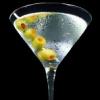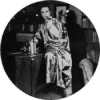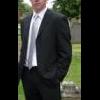Curious. I'm pretty sure that the Fleming Bond books also get a brief mention in "The Human Factor" (although that obviously doesn't automatically imply approval).
In WAYS OF ESCAPE, Greene wrote of the novel:
"My ambition after the war was to write a novel of espionage free from the conventional violence, which has not, in spite of James Bond, been a feature of the British Secret Service."
So it's a deliberate counter to Bond. In one of the early scenes, Davis complains to Castle that they never have anything interesting to do, and are never given any fancy gadgets to play with. He says something like 'James Bond wouldn't put up with this' but I'll have to look up the precise quote. I think it's affectionate, though of course it makes the point above.
I think there are several other subtle references to Bond in the novel. Colonel Daintry is a kind of Bond bachelor. He lives in a lonely two-roomed flat in St James' and struggles to prepare a meal for himself. Doctor Percival seems a riff on Sir James Molony, only he's much more unpleasant, and ditto Sir John Hargreaves, the murderous head of SIS.
One of the problems with the novel is that it took ten years for Greene to finish it. By the time it was finally published in 1978, there had been dozens of writers who had written novels of espionage free from the conventional violence. I like the novel a lot, but it's a little like reading a parody of Greene: you kind of know what's coming. Len Deighton's 1967 novel AN EXPENSIVE WAY TO DIE is, in some ways, more Human Factorish than THE HUMAN FACTOR, if you see what I mean. In Harold Pinter's 1966 script for THE QUILLER MEMORANDUM, there's a scene in which two senior British intelligence officers casually discuss the murder of an agent in Berlin over lunch:
'Interior. London club. Day.
A WAITER is serving potatoes to two gentlemen.
RUSHINGTON. Thanks. That's... quite sufficient, thank you.
The WAITER nods and goes.
GIBBS. Salt?
RUSHINGTON. Oh, thanks.
They salt their food and begin to eat.
GIBBS. What exactly is he doing now?
RUSHINGTON. He's on leave, actually. On vacation.
GIBBS. Ah.
They eat.
Well, perhaps someone might get in touch with him.
RUSHINGTON. Oh , yes, certainly. No difficulty about that.
GIBBS. Ask him if he'd mind popping over to Berlin.
RUSHINGTON. Mmmmm. I think so.
GIBBS. Good.
They eat.
Shame about K.L.J.
RUSHINGTON. Mmmmm.
GIBBS. How was he killed?
RUSHINGTON. Shot.
GIBBS. What gun?
RUSHINGTON. Long shot in the spine, actually. Nine point three. Same as Metzler.
GIBBS. Oh, really?
They eat.
How's your lunch?
RUSHINGTON. Rather good.
GIBBS. What is it?
RUSHINGTON. Pheasant.
GIBBS. Ah. Yes, that should be rather good. Is it?
RUSHINGTON. It is rather, yes.'
My copy of THE HUMAN FACTOR is at home, but anyone who's read it will remember that there are several scenes very similar to the above, in which Percival and Hargreaves talk about trout. Might track it down. Anyway, my point is that a lot of people were effectively writing the book a decade before Greene published it.









